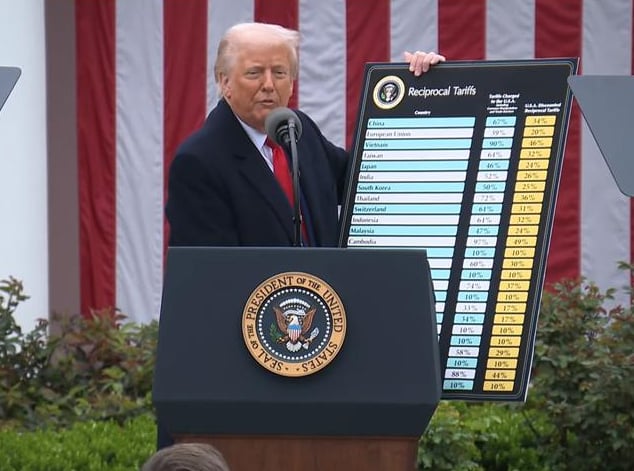November 28, 2025 | 02:53 GMT +7
November 28, 2025 | 02:53 GMT +7
Hotline: 0913.378.918
November 28, 2025 | 02:53 GMT +7
Hotline: 0913.378.918

President Donald Trump holds up a list of countries, their average tariffs and a new line of reciprocal tariffs he announced for trading partners. Trump said he would protect farmers and open up new markets for agricultural products, but his main goal is to stimulate domestic manufacturing jobs.
With countries like China (34%), Vietnam (46%), and Thailand (36%) facing steeper duties, India holds a relative tariff advantage, especially in seafood and rice exports.
India could maintain or even expand its agricultural exports to the United States despite newly announced tariffs, as competing nations face even steeper duties, agricultural economist Ashok Gulati said on Thursday. US President Donald Trump has announced reciprocal tariffs on countries across the board, declaring a 26 per cent "discounted reciprocal tariff" on India.
Trump's 26 per cent tariff on Indian goods would have a limited impact on key agricultural exports like seafood and rice when compared to higher duties imposed on regional competitors, Gulati said."We should not look at the tariff increase in absolute terms, but see relative tariff increases with our competitors," Gulati told PTI.
The former chairman of the Commission for Agricultural Costs and Prices (CACP) noted that while India faces 26 per cent tariffs, China faces 34 per cent, creating an 8 per cent differential advantage for Indian exporters.Other competitors face even steeper barriers, with Vietnam at 46 per cent, Bangladesh at 37 per cent, Thailand at 36 per cent, and Indonesia at 32 per cent, Gulati said.
For seafood exports, particularly shrimp, Gulati explained that India's relative tariff advantage combined with shrimp's small share in overall US food expenditure means demand is unlikely to shrink significantly.
Similarly for rice exports, where current US tariffs range between 9 and 11 per cent, India maintains a competitive edge against Vietnam and Thailand despite the increase to 26 per cent.Gulati, currently chair professor for agriculture at the Indian Council for Research on International Economic Relations (ICRIER), suggested India could potentially gain market share in spaces vacated by higher-taxed competitors.
economictimes

(VAN) China’s cooking oil is suddenly flooding into India. It all comes down to a soybean surplus that Beijing doesn’t quite know what to do with.

(VAN) An Giang promotes supply-demand connections, standardizes quality and builds value chains, creating a foundation for sustainable bird’s nest development and aiming to expand exports.
/2025/11/24/5339-4-nongnghiep-075331.jpg)
(VAN) Recently, the conference on 'Sustainable Fisheries Linkage Chain - Tilapia for Export' took place in Tien Hai commune, Hung Yen province.
/2025/11/21/4309-2-153400_128.jpg)
(VAN) Green and low-emission rice is paving the way for Vietnamese rice to enter high-end markets, marking the beginning of a transformation journey toward greening and elevating the national rice brand.

(VAN) ‘Right to Win’ outlines a national action plan that shapes a new vision for Viet Nam’s agriculture in an era of renewal and global integration.

(VAN) Lam Dong’s farmed sturgeon output this year is expected to reach 2,300 tons, worth VND 450 billion, affirming the brand’s position on the market.

(VAN) A surge in Ukrainian egg exports, largely driven by soaring sales to the UK over the last few years, has notably pushed up egg prices on the domestic market.